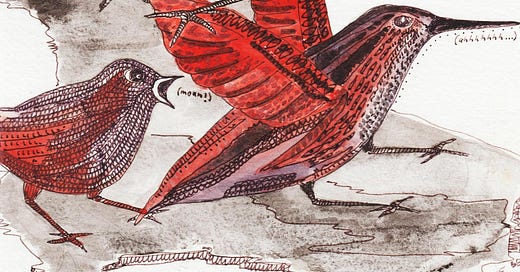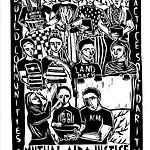Hello friends!
We dearly hope you have all gotten through Cyclone Alfred and its aftermath safe and dry.
For obvious reasons, and like a lot of people, we've been thinking a lot about disaster, crisis, climate change, community-based responses this week, in the aftermath of Cyclone Alfred here in Magan-djin, so-called brisbane.
In case you somehow missed it - South East Queensland was struck by its first cyclone in 50 years over the weekend, and while the cell technically weakened to a tropical low before it crossed the coast near Redcliffe, residents still reported wind gusts of over 110 kph on the coast. In addition to the wild winds, the cyclone also brought massive amounts of rain to the region, including falls of over 300mm in a single day. This led, predictably, to major flash flooding across the city, compounding the damaging impacts of the wind and subsequent coastal erosion.
So we’ve decided to pull together a couple of episodes of the podcast dedicated to digging into the political tensions, questions, and possibilities that emerge in times of acute disaster. In this first episode, we’re looking back at Cyclone Alfred and some of the ways that communities responded to, prepared for, and theorised their experiences of the crisis.
First up, we’re reflecting on the ways that governments and corporations make use of disasters like Cyclone Alfred to push through repressive and dangerous legislation. Just today, we saw the LNP Lord Mayor of so-called brisbane, Adrian Schrinner, announce plans for emergency evictions of people who have been sleeping rough in parks across the city - despite the fact that there is no affordable, appropriate accommodation. There’s been a lot of disingenuous claims made by the Lord Mayor in announcing these measures - including the claim that everyone sleeping rough in the city has been offered alternative accommodation and turned it down in favour of staying in the park. But what’s clear already is that the immediate aftermath of Cyclone Alfred has created an ideal backdrop for the city council to push ahead with their plan to fully dismantle all of the communities that have - by necessity - taken up residence in parks across the city. This is an absolutely horrific example of a government utilising an environmental disaster to expand systems of control and repression under the guise of “public safety” and “protection.”
If you’re as outraged as we are, get along to this snap rally at Musgrave Park this Sunday 16th May from 3.30pm - 5.30pm: “Where are they meant to go?”: How can we resist police moving on the homeless?
Next up in this week’s episode, we’re looking towards more optimistic horizons - catching up with our good friend and climate comrade, Moira Williams, who is a long-term activist and advocate with Move Beyond Coal. In a short phone interview, Moira shares some of her reflections and insights into the importance of local and community based organising and support networks during times of disaster, and how those networks might work alongside broader political campaigns to challenge those responsible for the ongoing threat of climate collapse.
Check out the “Support your Street” guide that Moira mentions and start organising with your own neighbours to make sure that you’re well-prepared for the next disaster! And in the meantime, if you’ve been impacted by the cyclone and you want support, there’s a heap of community-led initiatives supporting people as they embark on recovery efforts. The Greens across the city have been redirecting all of their volunteer capacity towards supporting local recovery efforts, so reach out to the teams in Griffith, Brisbane, Maiwar & our dear friend and comrade Remah Naji’s campaign in Moreton to get involved with ongoing support efforts.
If you are feeling politically frustrated by the failures of governments and corporations to take the risk of climate collapse seriously, get along to the upcoming Cyclone Speak Out at Speakers Corner outside the Queensland Parliament next Thursday 20th March from 10am. You’ll hear from communities directly impacted by Cyclone Alfred, as well as organisers working towards climate justice in a variety of different ways.
And a reminder that you can also head along to the regular protests outside the Boeing headquarters at 123 Albert St (cnr Charlotte St) in the city from 12noon on Wednesdays. It’s a timely reminder that the global weapons trade and military industries are both major contributors to carbon emissions across the globe. As our comrade Remah Naji explains:
“A couple of years ago, a report revealed that if the world’s militaries were treated as a single nation, they would rank fourth in carbon emissions - just behind China, the USA and India, but ahead of Russia. This puts military-related fossil fuel emissions above both the aviation and shipping industries combined. This massive source of carbon emissions continues to be largely unrecognised because a lot of mainstream environmental groups don’t want to directly challenge the military industry.”
There’s a lot to dig into once we start pulling back the layers of ecological and environmental disasters, that’s for sure! So make sure that you keep joining us over the next few weeks as we dig further into these questions and try to make better sense of the politics of natural disasters & the struggle for a collective future.
Yours in solidarity,
The Radio Reversal Collective









Share this post